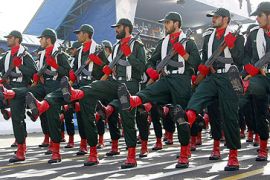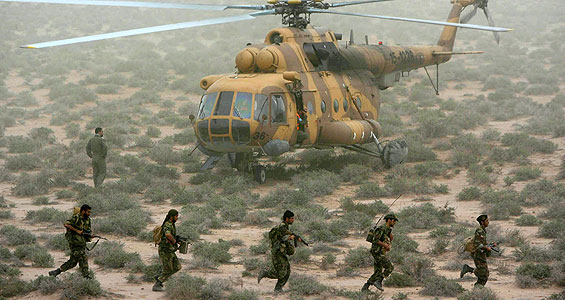Q&A: Iran’s Revolutionary Guards
The Guards force was established to protect the values of the Islamic revolution.

 |
| The Revolutionary Guards has army, navy and air units as well as covert operatives [AFP] |
Iran‘s Islamic Revolutionary Guards Corps (IRGC) has expanded in the past 30 years into a potent force with military, political, social and economic interests.
What is the IRGC?
The IRGC was set up after the 1979 Islamic revolution to protect the ruling system against internal and external threats, but has since expanded beyond its original mandate. It answers to Ayatollah Ali Khamenei, the Islamic Republic’s highest authority.
It controls the Basij religious volunteer militia, which enforces Islamic social codes and quells civil unrest. Millions of people are said to have volunteered.
The Qods (Jerusalem) Force is a shadowy part of the Guards that carries out special operations abroad. The US, which says the Qods Force backs fighters in Iraq, Lebanon and Afghanistan, has imposed sanctions on firms and individuals that have links to it.
The US also says the Guards is a proliferator of weapons of mass destruction and has a role in Iran’s nuclear and ballistic missile programmes. Tehran says its nuclear programme is for peaceful purposes alone.
What are the IRGC’s military capabilities?
The IRGC initially dealt with internal security, but became an organised fighting force during the war with Iraq. It has about 125,000 members with army, navy and air units. It operates separately from the 350,000-strong regular army.
Guardsmen fought in conventional battles against Iraq, but they also used irregular tactics, such as hit-and-run raids in small craft against shipping.
An Iranian military commander has said “martyrdom-seeking” Basijis could disrupt Gulf oil-shipping routes if the need arises.
The IRGC controls Iran’s strategic missile forces and has played a role in developing advanced systems such as the Shahab-3 missile with a range of 2,000km.
How does IRGC operate in the political system?
The IRGC’s mandate to protect revolutionary values has prompted it to speak out when it feels the system is threatened.
General Yadollah Javani, the director of the IRGC’s political arm, said the Guardsmen who suppressed post-election protests this year had thwarted an attempt to overthrow Islamic rule.
The IRGC’s influence appears to have grown since Mahmoud Ahmadinejad, the Iranian president, came to power in 2005. Two-thirds of his first 21-man cabinet were IRGC veterans, like himself.
Some analysts suggest the corps’ political power already eclipses that of Ahmadinejad. Given Khamenei’s reliance on the Guard to put down dissent, the supreme leader himself may now be hostage to the force he commands, some analysts suggest.
Others say the IRGC leadership is divided and lacks the cohesion to wield power independently. Some ex-Guard officers, including Ali Larijani, the parliament speaker, Mohammad Baqer Qalibaf, the mayor of Tehran, and Mohsen Rezaie, a defeated presidential candidate, are critics of Ahmadinejad.
The IRGC also conducts military training, operates a domestic media apparatus and runs education programmes to inculcate loyalty to the revolution.
What about business interests?
After the war with Iraq, the IRGC became involved in reconstruction and has expanded its work to cover import-export, oil and gas, defence, transport and construction.
The Corps has become a contractor, with ties to firms controlling billions of dollars in business, construction, finance and commerce, the US treasury has said.
A Rand Corporation report this year said Khatam al-Anbia, an engineering firm affiliated to the IRGC, had been awarded more than 750 contracts in construction, infrastructure and energy projects.
It said the Guards are also reported to control an underground economy of black-market goods smuggled into Iran via illegal jetties and other entry points under their sole control.